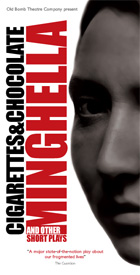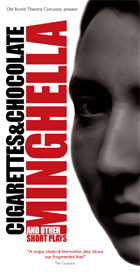Three weeks to go. I need to apply some urgent thought to technicalities – which sections of the Mathew Passion work best and where, if there are any costume props I’ve missed that might help inform the action, and decide (if that’s possible) on scene transitions. So it’s over to Hannah (who’s playing Lorna) who can share her thoughts on the process so far…
“I love the challenge of cracking open the soul of a new character. For me the first step in this process lies in the words on the page, which I read over and over again as soon as I get my script. Often out loud. Often in the kitchen for some reason. Often to the utter bewilderment of my family members who call through ‘What? Are you talking to me? What was that?’ and then they tut and roll their eyes when they realise I’m pretending to be someone else again.
I’m starting to find parts of my character, Lorna, now. In one of our early workshops we were experimenting with walks and rhythms and this is something which I think is essential. Our bodies say so much about us, each muscle holds a memory, a story. Our postures reflect our inner worlds and hold clues about how we feel about the outer world, so finding a way to move can really help to unlock a character. One of Lorna’s lines in the play tells us she believes she has an ‘incapacity to love’ and I took this as a starting point for her physicality. In order to physicalise this statement, I experimented with the notion that Lorna had some kind of freeze or blockage around her chest/heart area. Using this as a starting point I came up with a way of moving which kept her centre of gravity very high in her body, and which had a slight stiffness in her left arm. This subtly altered the way I held myself and gave me a visceral experience of how it might feel to move within this woman’s body. I was left with a feeling that Lorna was always trying to rise above her emotions and her arm was always poised defensively lest they should try and suddenly overwhelm her.
With scraps of Lorna’s words ringing round my head (and house) and an overall gesture which I felt captured the essence of her I went back to the text in earnest. I made a list of all the things Lorna said about herself and of all the things that other characters say about her in the play. Although time consuming, and a little bit like doing homework, this is always a great way to mine information and it often throws up tiny details that can be crucial to character development. This groundwork provided me with lots of questions about this woman. I’m becoming very intrigued about her and her life. Some of these curiosities can be answered by other information offered in the script, but a lot is left unsaid or unspecific so now I am moving into the next stage of character work: creating the imaginative world that surrounds my character, the details of her daily routine, what she might wear, her likes and dislikes, her hopes and fears, the dynamics of her intimate relationships, the different personas and versions of herself that she inhabits. All this work helps to flesh out the words on the page. I have started to carry Lorna around in my head as a sub version of myself. She goes through my day with me and I spend time with her in the quiet gaps. I ask myself what she’d do if she were me? What would frustrate her about my life? What would excite her? At night before going to sleep I close my eyes and conjure her up and watch her move about her business. I spy on her. In a good way.
When working on a character I look to the text for the moments of choice and the moments of change and the moments where they realise something about themselves for the first time. These are the special moments that I want to underline for my audience. Perhaps most importantly though I focus on what my character does. Why are my characters actions important to the story of the play? The old phrase actions speak louder than words is crucial to character development. What are we really, if not a sum of our actions?
Finally, in response to Paul’s request that we all find a song that sums up our characters, I have been trawling through 80s pop music. I wanted to find something that not only would Lorna enjoy listening to, but something which reflects something of her being too. I have finally settled on a Cyndi Lauper song, as I feel it perfectly captures the way Lorna is stuck in a cycle of destructiveness of her own making, and beautifully portrays the acute pain that sits right at the core of her being. I haven’t sung it for the rest of the cast yet, but I am sure this is something that Paul will pull out of us all at some point.
All I need to do now is find her voice. Oh and learn the lines… I better get back to ranting in the kitchen!” (Hannah Dee)
Filed under: Cigarettes & Chocolate | Tagged: amateur, Directing, Director, drama, Paul Osborne, Theatre | Leave a comment »





